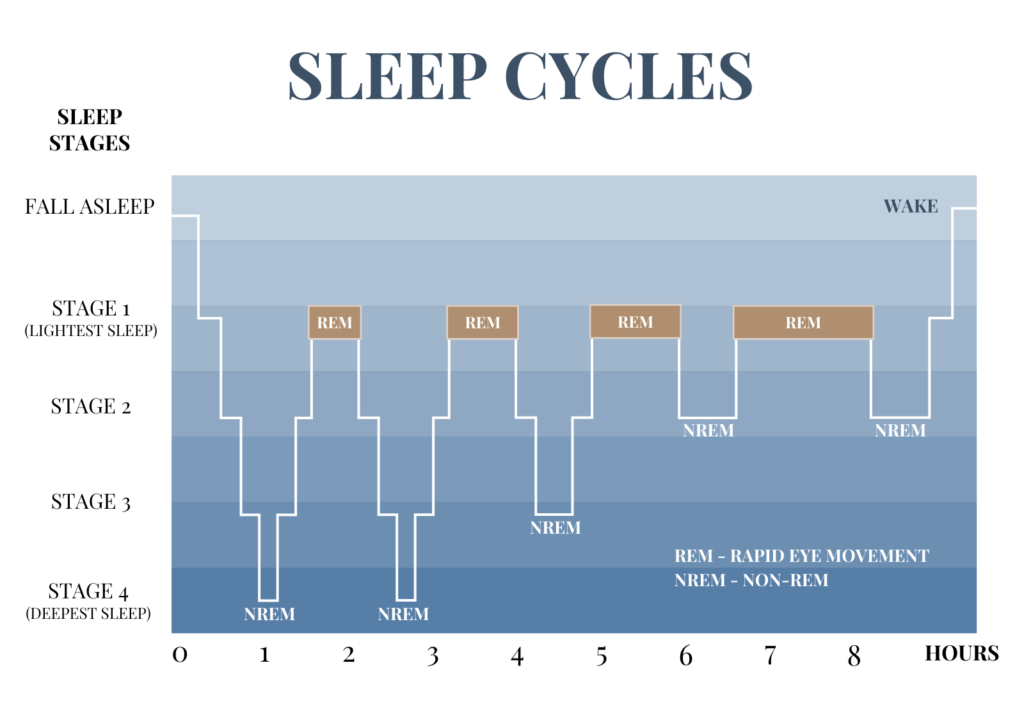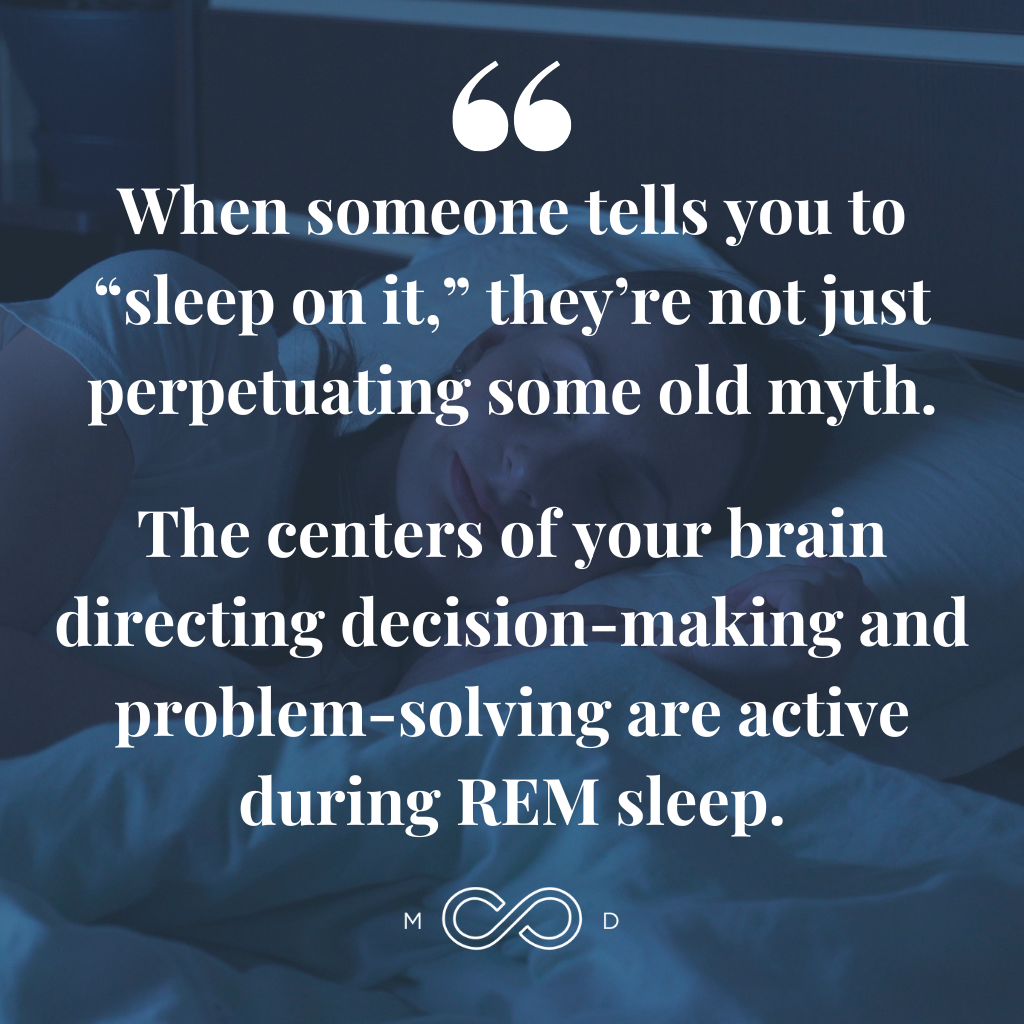Are you dreaming of better sleep?
Being well rested not only feels good, it’s also good for you. But sleep isn’t just one, simple thing — it’s made up of several stages. One of those stages is REM sleep, which stands for rapid eye movement sleep. This is when dreams happen, so it’s sometimes called “dream sleep.” And don’t worry: Even if you don’t remember your dreams, you’re still cycling in and out of REM sleep throughout the night.
REM sleep is a catchy and well-known term, even though it comprises only about a quarter of your total sleep. (It may make you think of the rock band R.E.M., but in this context, REM is actually pronounced as a word that rhymes with “stem.”)
Still, REM sleep is important, and we’ll discuss how to get more REM sleep below. Just remember, the other components of your total nightly sleep are equally crucial. My colleague Dr. Wenzel has written a lot about the importance of sleep in blog posts such as Don’t Sleep on Sleep and Sleep Deprivation: How Your Lack of Sleep Is Killing You. In this post, I’ll focus on REM sleep and its role in your overall health and well-being.
Stages of Sleep: Non-REM Comes First
Sleep occurs in cycles, with each cycle lasting roughly 90 minutes. For simplicity’s sake, I like dividing the sleep stages into two categories: REM sleep and non-REM sleep.
We generally say there are three phases of non-REM sleep, each deeper than the last. As you progress through these stages, you get deeper into your sleep cycle. This correlates to:
- Slower brain waves
- Decreased heart rate
- Lower blood pressure
- Lower body temperature
These changes create an internal environment that promotes healing and restoration of all bodily systems. You experience cardiovascular rest and recovery. Your immune system heals from the trauma of the day and replenishes cell counts, which primes your body to fight inflammation and infection the next day.
During non-REM sleep, your short-term memories are solidified in the portions of your brain that house longer-term memories. Information you were exposed to during the day is consolidated into your memory banks as well.
 REM Sleep Is Where the Action Is
REM Sleep Is Where the Action Is
We tend to think of sleep as very passive. “Dead to the world” is a well-known (if slightly morbid) description of nightly slumber. However, REM sleep is a very active experience for your body.
Unlike its non-REM counterparts, REM sleep comes with increased brain wave activity. Your heart rate and blood pressure actually elevate slightly during this very active stage of sleep. Remember that REM sleep is “dream sleep,” and dreams can be quite action-packed.
An interesting thing about REM sleep is that it gains momentum with each sleep cycle. In other words, each REM cycle throughout the night is a bit longer than the last. Unfortunately, that momentum is lost when your sleep cycle is disrupted — for example, if you have sleep apnea. And if you don’t get enough sleep overall, your sleep cycles don’t have the runway to gain adequate momentum.
Though REM sleep makes up only 25% of your nightly sleep cycle, it has big ramifications for your emotional and mental health:
Mood
Lack of sleep can make anyone cranky. But when you miss out on adequate REM sleep, your mood can take a big hit. The centers of your brain that direct your mood light up during REM sleep, so think of REM sleep as internal therapy!
Problem solving
When someone tells you to “sleep on it,” they’re not just perpetuating some old myth. The centers of your brain directing decision-making and problem-solving are active during REM sleep. Your most vexing problems and dilemmas can look much clearer after quality REM sleep.
Memories
While non-REM sleep is associated with the formation of long-term memories, REM sleep is related to short-term recall. Short-term memories and experiences from your day — names of people you met, details about an upcoming appointment — are filed away into the neurologic system during REM sleep.
Dementia
We know that insufficient sleep can diminish our short- and long-term memory. Studies also show that less REM sleep is tied to a greater risk for dementia. It makes intuitive sense that the inverse may be true — that adequate REM may be a proactive tactic to protect your cognitive abilities. At the very least, getting more REM sleep can’t hurt.
This in particular reinforces the importance of sleep habits in our overall sleep story.
Tips on How to Get Better REM Sleep
You aren’t at the mercy of some sleep cycle god. There are steps you can take to ensure more and better REM sleep.
- Aim for seven to nine hours of sleep per night. This provides enough time for your REM sleep cycles to build adequate momentum.
- Stick to regular sleep and wake times. You can train your body into a consistent pattern, within which your hormones and neurotransmitters thrive and optimize your ability to get appropriate levels of sleep in each stage.
- Cultivate a healthy bedtime routine, also called sleep hygiene. Encouraging your body to start high-quality, efficient sleep at the very beginning of the night provides more time for momentum to pick up. Try activities such as meditation, gentle stretching, or a warm bath or shower. This helps optimize your body’s ability to get into its first sleep cycle.
- Avoid alcohol close to bedtime. Yes, alcohol can make you drowsy; it’s a sedative, and many people use it to reduce stress and get to sleep. What most people don’t know is that once you’re asleep, alcohol actually harms your sleep cycles. Sleep is an active process, especially REM sleep, and if you suppress it with alcohol, you limit your body’s ability to experience all the crucial processes mentioned above.
- Avoid late-night snacking or large meals close to bedtime. Your body needs to focus its energy on appropriate sleep, not the distraction of digestion. Digestion can alter the brain’s ability to slow down and get into those early stages of sleep.
Final Thoughts
If you’re wanting to learn how to get more REM sleep, one final consideration is sleep quantity. And no, six hours is not enough.
Let’s say you have four sleep cycles during the night, with progressively longer REM stages happening at the end of each cycle. If you sleep for six or fewer hours and don’t get into later cycles of REM, you don’t get the full benefits of your longest REM sleep cycles. Going to bed earlier will give you the time your body needs to take full advantage of your sleep cycles.
And remember, while REM sleep is important, every sleep stage has value. Aim for seven to nine hours of sleep per night, and take steps to optimize your sleep. Your body and mind will thank you.

Dr. Wright joined Brentwood MD in 2022 as the model allows him to spend more time connecting with patients and build a foundation of exceptional care. He is a Nashville native and completed his family medicine residency at the University of Tennessee Health Science Center, where he also served as Chief Resident. He believes that your health deserves a prominent position on your priority list, and would be honored to serve you and your family.








